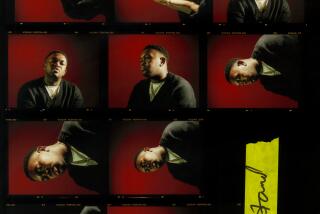DJ Changes the Mix : With his aggressive show on Santa Monica-based KCRW-FM, Michael Mixx’in Moor shifts his focus from party music to political messages
The show had started as it always does, with the muted trumpet squeal of an old Miles Davis track, blending into what would again be two hours of music and fast dialogue, racial politics and a harsh urban drama. This was host Michael Mixx’in Moor’s special “post-nuclear happening,” an audio collage for his listeners, just days after the not-guilty verdicts in the Rodney G. King beating.
Much had already happened, of course, by the midnight broadcast time of Moor’s “Militant Master Mix” show that Saturday night. And here it all was again, all the rage and despair, the looting and the fires, violence and loss, recast in this bleak, funky radio signal from the Santa Monica studios of KCRW-FM. Now he was playing some smooth funk by Herbie Hancock, with its swirl of keyboards and horns and pre-hip-hop beats, mixed amid a storm of lurid news commentary and radical speechifying.
“The whole black nation has to be put together as a black army,” roared some ‘60s-vintage Eldridge Cleaver, recorded during his Black Panther days. “And we’re going to walk on this nation, we’re going to walk on this racist power structure and we’re going to say to the whole damn government: Stick ‘em up! This is a holdup! We’ve come for what’s ours!”
Soon enough, Moor quickened the musical pace, scratching and mixing in some harder beats with a racket of gunfire, sirens and outraged voices, leading ultimately to the tough rap of Public Enemy’s “Burn Hollywood Burn.” But if the night’s show seemed particularly topical, given the week’s events, the messages actually strayed little from Moor’s ongoing theme of the past year, since launching the “Militant Master Mix” at another station within days of that infamous beating of March, 1991.
These aggressive on-air politics, Moor says now, were in a direction he’d been moving anyway, no longer content with the art of creating an upbeat party groove through clever blends of dance songs.
“I figured I needed to get another approach with this rap thing,” says Moor, who has also worked as a record remix producer-editor for such artists as Chaka Khan and Ice-T. “And because I was already into the politically conscious rap, and coming into the teachings of Islam, it was time. The messages just had to be put out there, because as a people, the black people are asleep. And the ones who do have a way out just leave the community.”
That first “Militant Master Mix” was broadcast on KJLH-FM in the Crenshaw District, and included sampled bits of melodramatic commentary on King from KCBS-TV anchor Michael Tuck and a rap number by the Main Source titled “An Early Game of Baseball.” Moor had entered a new medium, one that emphasizes knowledge over dance-floor bliss. New York rapper KRS-One likes to call this blunt style of hip-hop “edutainment.” And even as he’s mixing these crazy beats, Moor says, “I don’t want you partying to the ‘Militant Master Mix.’ ”
He’s had enough of that for now, after a decade of mixing party records, helping to build the contemporary Los Angeles dance club scene with a New York-style mix of pop and rap at such venues as the Hollywood Palladium and Florentine Gardens in Hollywood.
Moor’s been at KCRW (89.9 FM) since August, after urban contemporary station KJLH ejected him for broadcasting words and messages its management says listeners found objectionable. But in the months since landing at the Santa Monica station, Moor has maintained the show’s same style and content, dramatically spotlighting events he says illustrate a continuing injustice toward blacks in American society.
One recent program incorporated an unreleased rap song about Latasha Harlins, the young black girl fatally shot by a Korean grocer who was subsequently given probation. And several weeks ago, local hip-hop luminary Def Jef was visiting Moor’s small home studio to record some freestyle rap verses for the “Militant Master Mix.”
Even now, Def Jef is bobbing and strutting to the music Moor’s got spinning on one of his turntables. It’s an obscure funk track, even if the walls of this Los Angeles duplex are decorated with gold and platinum record awards from such pop artists as Madonna and Jody Watley.
And now Def Jef launches into his critical rap:
Columbus Day, Christmas, Easter and Thanksgivin’;
But stop and think about the thanks you’re givin’
Are you thanking the pilgrims for killing Indians?
Or giving gifts on the 25th to flaunt your dividends?
On the third day I heard they say Jesus rose;
It’s not a church day, it’s a day for new clothes.
The message is much like that on Def Jef’s own “Soul Food” album, though the rapper says it’s rare to hear such talk on commercial radio. So Jef was here, rapping in these cramped quarters, free of charge. “That’s why I participate in it, because it’s from a militant standpoint,” he says. “I don’t think all the radio stations should be militant and play the same things that Mike plays. That’s what makes Mike stand out.”
For KCRW, the public station that broadcasts from a basement of Santa Monica College, the “Militant Master Mix” has been an opportunity for this “voice of the Westside” to broaden its constituency, says music director Chris Douridas. Evidence enough of Moor’s impact was felt during a recent pledge drive, which had calls coming in from Beverly Hills and Watts, Santa Monica and Compton during the hours the DJ was on the air.
“There’s no real way of knowing how many new listeners from those parts of Los Angeles Michael’s brought to the station,” Douridas says. “But one thing is for sure: We’re starting to talk to them more.”
Moor arrived at KCRW via guest spots on the station’s “Bustin’ Loose” show, a haven for his sociopolitical mixes when his “excessive profanity” and a repertoire that included the Last Poets’ “Niggers are Scared of the Revolution” had led management to end his work at KJLH. He’s still bitter when talking of his last days at KJLH, where he’d worked in various capacities on and off since 1981.
The dramatic style and messages of the “Militant Master Mix,” Moor says, were merely following precedents made in the music of station owner and pop artist Stevie Wonder, who dramatized inner-city life in such songs as “Living in the City.”
Moor adds: “Stevie Wonder always stressed that he wanted to create that theater of the mind. That was his thing. He wanted to be able to see the music he was hearing.”
He says, “There were a couple of words I would use from time to time to emphasize, or to get a point across: like ‘the police are kicking my black ass.’ I’m not trying to use anything that’s disrespectful or derogatory.”
But the content and language of Moor’s show jeopardized KJLH’s broadcasting license, says general manager Karen Slade. She had only been looking to recapture the youth market with young club DJs and a mix of urgent hip-hop numbers on Friday and Saturday nights.
“He pushed the realm of our policy,” Slade says. “It wasn’t personal. Perhaps our music director at the time could have handled it more humanely. In the end we have to protect the owner and the owner’s license.
“I have a multicultural listenership, a multi-aged listenership, and I can’t protect everyone,” Slade says of an audience she characterized as 70% black. “But you don’t want to offend.”
At KCRW, Moor hasn’t had any of these problems, other than the occasional listener calling in during the show to label him a racist. Such calls often are in response to a speech from Malcolm X or Louis Farrakhan that Moor has excerpted and mixed into his program. But he says he usually keeps those callers on the line, sometimes for as long as 45 minutes, to explain himself. “I’m pro-black,” he says. “But we’ve got to work out our differences and try to get to a common level of peace.
“The show does talk to those who are racist and who don’t have an open mind,” Moor says. “They’re the ones who are getting attacked on the show. And when we say the white man is a devil, we’re not necessarily talking about all white people. We’re talking about a mentality, a makeup of an individual. It can come from black or white.
“It’s so important that we try and educate one another, because that’s the way we all get free.”
Moor comes out of a “lower middle-class” background, he says, in which both his parents worked, and his father held two jobs. He still lives in the same general neighborhood, just south of Wilshire Boulevard, where his mother tried to protect her children from the violence of the city. “They did what they could to keep us, not sheltered, but keep us safe. Because they knew the real world was ugly.”
But Moor never forgot a late-night ride in which his father took him and a younger sister through the poorer sections of town, with their “prostitutes, pimps, the night life.”
It was during a more recent car trip across town with Douridas that Moor revealed to the KCRW music director that he’d dreamed as a child of becoming President.
“And you could just see this little guy with all the hopes and dreams in the world in his eyes,” Douridas says, “and there was a turning point where he realized those dreams weren’t what he thought they would be. And he went inside himself to find another way to have an impact.
“For me, Michael brings to mind a very important ideology: What are you doing if you’re not making a difference? He seems to be asking himself that question, and I admire the hell out of that.”
More to Read
The biggest entertainment stories
Get our big stories about Hollywood, film, television, music, arts, culture and more right in your inbox as soon as they publish.
You may occasionally receive promotional content from the Los Angeles Times.











